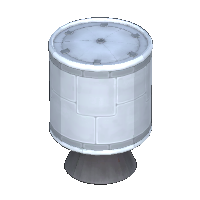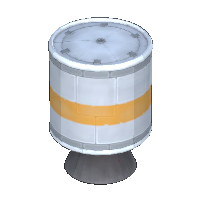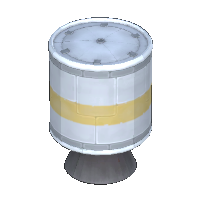Difference between revisions of "RT-5 "Flea" Solid Fuel Booster"
AlpacaMall (talk | contribs) m (creating link chain w/ other 1.25m SRBs) |
Anaxagoras (talk | contribs) (→Usage: why it's quickly obsoleted) |
||
| Line 11: | Line 11: | ||
== Usage == | == Usage == | ||
| − | Like other SRBs, the Flea can be fired once, and cannot be shut down or throttled once active. While assembling a vessel, it is possible to adjust the amount of solid fuel and thrust using [[tweakables]] in the [[VAB]] or [[SPH]]. If planned properly, this can provide some control during flight. | + | Like other SRBs, the Flea can be fired only once, and cannot be shut down or throttled once active. While assembling a vessel, it is possible to adjust the amount of solid fuel and thrust using [[tweakables]] in the [[VAB]] or [[SPH]]. If planned properly, this can provide some control during flight. |
The minimum thrust required for the Flea to lift its own weight off Kerbin's surface is about 9%, or about 14.7 kN. | The minimum thrust required for the Flea to lift its own weight off Kerbin's surface is about 9%, or about 14.7 kN. | ||
| − | In most non-[[Sandbox mode|Sandbox]] games, a player's first rocket will be a [[Mk1 Command Pod]] atop a Flea. Because the Flea is light, a [[Mk16 Parachute]] is able to | + | In most non-[[Sandbox mode|Sandbox]] games, a player's first rocket will be a [[Mk1 Command Pod]] atop a Flea. Because the Flea is light, a [[Mk16 Parachute]] is able to bring both the Flea and Command Pod to a safe landing, without needing to decouple the Flea. |
| + | |||
| + | The Flea has the highest thrust-to-weight ratio of any solid booster (except the tiny [[Sepratron I|Sepratron]], which is not designed to be used for propulsion). But its [[specific impulse]] is considerably lower than other boosters'. It also carries rather little fuel even relative to its small size, with a lower ratio of full to empty mass than any other booster, and thus has a very short burn time. Any other booster is generally both more effective and more cost-effective than the Flea, starting with the [[RT-10 "Hammer" Solid Fuel Booster|Hammer]], which is already available at the second level of the tech tree. So the Flea is less commonly used beyond the very early game. | ||
Like other engines, activating the Flea while a part is attached below it will cause the attached part to rapidly overheat and explode. This can be used as an ad hoc decoupler (see [[explosive decoupling]]). This is useful in mission-race Career games for maximizing [[Science]] while at the lowest level of the [[technology tree]], before proper decouplers are available. | Like other engines, activating the Flea while a part is attached below it will cause the attached part to rapidly overheat and explode. This can be used as an ad hoc decoupler (see [[explosive decoupling]]). This is useful in mission-race Career games for maximizing [[Science]] while at the lowest level of the [[technology tree]], before proper decouplers are available. | ||
| − | + | With extremely large rockets, the Flea's high TWR allows it to function as a scaled-up [[Sepratron I|Sepratron]]. | |
== Variants == | == Variants == | ||
Revision as of 19:32, 5 October 2023
| RT-5 "Flea" Solid Fuel Booster | ||
| Solid rocket booster by Found lying by the side of the road | ||
| Radial size | Small, Radial mounted | |
| Cost | (total) | 200.00 |
| (dry) | 116.00 | |
| Mass | (total) | 1.500 t |
| (dry) | 0.450 t | |
| Drag | 0.2-0.3 | |
| Max. Temp. | 2000 K | |
| Impact Tolerance | 7 m/s | |
| Research | | |
| Unlock cost | 0 | |
| Since version | 1.0 | |
| Part configuration | solidBoosterRT-5_v2.cfg | |
| Maximum thrust | (1 atm) | 162.91 kN |
| (vacuum) | 192.00 kN | |
| Isp | (1 atm) | 140 s |
| (vacuum) | 165 s | |
| Fuel consumption | 15.82 | |
| Thrust vectoring | No | |
| Burn time | (1 atm) | 7.5 s |
| (vacuum) | 8.8 s | |
| Testing Environments | ||
| On the surface | No | |
| In the ocean | No | |
| On the launchpad | Yes | |
| In the atmosphere | Yes | |
| Sub-orbital | Yes | |
| In an orbit | Yes | |
| On an escape | No | |
| Docked | No | |
| Test by staging | Yes | |
| Manually testable | Yes | |
| Packed volume | None | |
| Solid fuel | 140 | |
The RT-5 "Flea" Solid Fuel Booster is a solid rocket booster (also known as an SRB) used to provide a short burst of additional thrust to a rocket. It comes as a single unit. The engine and fuel tank are one single part which means that it isn't possible increase the burn time for it by adding more fuel tanks.
The Flea is the first engine unlocked in the tech tree, and is available to players at the start of a Career or Science mode game. It is the smallest 1.25m solid rocket booster, smaller than the RT-10 "Hammer" Solid Fuel Booster.
Product description
| “ | While considered by some to be little more than "a trash bin full o' boom", The RT-5 can be seen in use at many space programs, perhaps possibly because it is the only option for many space programs, but nevertheless, this small booster provides a nice kick to lift small payloads to considerable heights. Use with caution, though. Once lit, solid fuel motors cannot be put out until the fuel runs out. | ” |
Usage
Like other SRBs, the Flea can be fired only once, and cannot be shut down or throttled once active. While assembling a vessel, it is possible to adjust the amount of solid fuel and thrust using tweakables in the VAB or SPH. If planned properly, this can provide some control during flight.
The minimum thrust required for the Flea to lift its own weight off Kerbin's surface is about 9%, or about 14.7 kN.
In most non-Sandbox games, a player's first rocket will be a Mk1 Command Pod atop a Flea. Because the Flea is light, a Mk16 Parachute is able to bring both the Flea and Command Pod to a safe landing, without needing to decouple the Flea.
The Flea has the highest thrust-to-weight ratio of any solid booster (except the tiny Sepratron, which is not designed to be used for propulsion). But its specific impulse is considerably lower than other boosters'. It also carries rather little fuel even relative to its small size, with a lower ratio of full to empty mass than any other booster, and thus has a very short burn time. Any other booster is generally both more effective and more cost-effective than the Flea, starting with the Hammer, which is already available at the second level of the tech tree. So the Flea is less commonly used beyond the very early game.
Like other engines, activating the Flea while a part is attached below it will cause the attached part to rapidly overheat and explode. This can be used as an ad hoc decoupler (see explosive decoupling). This is useful in mission-race Career games for maximizing Science while at the lowest level of the technology tree, before proper decouplers are available.
With extremely large rockets, the Flea's high TWR allows it to function as a scaled-up Sepratron.
Variants
As of version 1.5 this solid fuel booster has three textures that can be switched in the editor.
Changes
- New model and texture
- Added 3 variants
- Initial release
References


